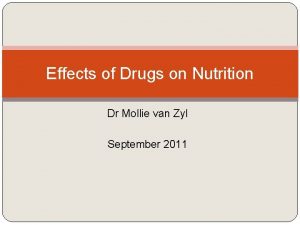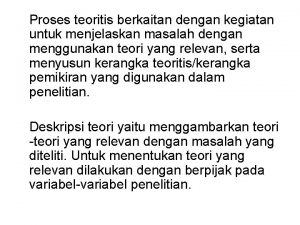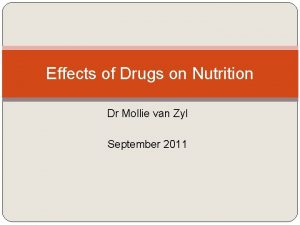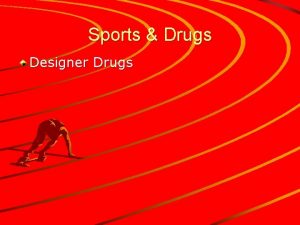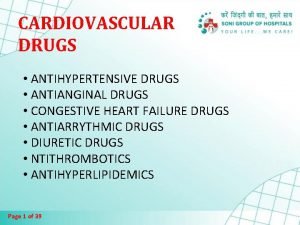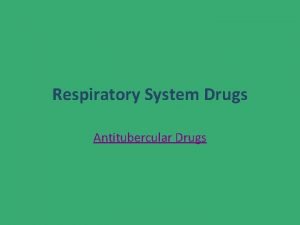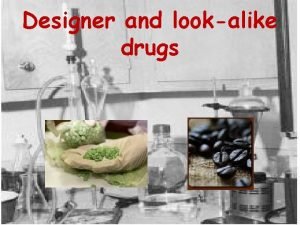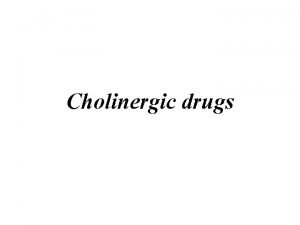Effects of Drugs on Nutrition Dr Mollie van














- Slides: 14

Effects of Drugs on Nutrition Dr Mollie van Zyl September 2011

Drug –nutrient interactions are broadly divided into drugs that : i) adversely affect nutritional status by : impairing the intake of food the absorption, metabolism and excretion of nutrients, and ii) conversely the adverse effect on drug metabolism by impairing their absorption and therefore their efficacy.

Table 1 Examples of medication with specific dosing instructions 30 min before food or on an empty stomach Phenoxymethylpenicillien Itraconazole Not to be taken with indigestion medication Ketoconazole Not to be taken with iron, zinc or antacid preparations Ofloxacin Levofloxacin Doxycycline Penicillamine Not to be taken with milk, iron, zinc or antacid preparations Ciprofloxacin Norfloxacin Tetracycline

Table 2 Drugs associated with anorexia or weight loss. Amantadine Digoxin Fluoxetin Levodopa Lithium Metformin Penicillamine Topiramate Nortriptyline

Table 3 Drugs associated with weight gain. Tri-cyclic antidepressants excluding nortryptiline Valproate Beta blockers Oral contraceptives Anti psychotics Steroids Anabolic steroids

Table 4 Drugs commonly associated with nausea and vomiting. Action on chemoreceptors in the GIT Cytotoxics Potassium Iron preparations Antibiotics Action at the chemoreceptor trigger zone Cytotoxics Anaestetics Opiates Nicotine Levodopa Selective serotonin re-uptake inhibitors (antidepressants)

Table 5 Drugs associated with decreased gastrointestinal motility. Anticholinergic effect Tricyclic antidepressant Oxybutynin Propantheline Opiates Morphine Codeine Ondansetron

Table 6 Drugs associated with diarrhoea. Erythromycin Metoclopramide and Domperidone Broad spectrum antibiotics Misopristil Proton pump inhibitors Antivirals and anti retrovirals Lamivudine, tenovir Magnesium salts Iron Lithium (sign of toxicity) Digoxin (sign of toxicity) Acarbose Metformin Colchicine (sign of toxicity)

Table 7 Drugs associated with dry mouth. Anticholinergic drugs Atropine, Oxybutynin, hyoscine, benztropine Antidepressants and antipsychotic drugs SSRI citalopram, fluoxetine, paroxitine, venlafaxine Sedatives Diazepam, temasepam Tricyclic amitryptiline, imipramine Analgesics Codeine, methadone, tramadol, buprofen Diuretics Furosemide, chlorothiazide Antihistamines Astemisole, chlorphenamine Antihypertensives ACEI Captopril, enalapril, lisinopril loratidine Clonidine, Methyldopa Carbamazepine, carbidopa, levodopa, ipratropium Muscle relaxants Orphenadrine

Table 8 Drugs associated with ageusia, hypogeusia. ACEI Benzodiasepines Metformin Amphetamines Cephalosporins Methotrexate Amiloride Claritromicin Metochlopramide Amphoteracin Clopidogrel Nifedipine Ampicillin Corticisteroids Spironolactone Asperin Diltiazem Sucralfate Azathioprin Furosemide Tricyclic antidepressants Baclofen Levodopa Venlafaxine

Table 9 Drugs associated with dysgeusia. Bitter taste Asperin Carbamasepine Clarithromycin 5 Fluoro-uracil Isosorbide mononitrate Levodopa Risperdal Metalic taste Allopurinol Captopril Ethambutol Litium Metformin Metronidazole Sartan antihypetensives Sulphasalazine Nifedipine

Table 10 Drugs associated with olfactory disturbances. ACEI Cocaine Methotrexate Amikacin corticosteroids Pentamidine Amiodarone Decongestants Quinolones Amphetamine Doxycycline Statins Amoxillin Gemfibrozil Streptomycin Beta blockers Gentamycin Sumatriptan Calcium channel blockers Isotretanoin Terbinafine Chlorhexidine Levodopa Tobacco

Table 12 Absorption of selected drugs that may be affected by food Drugs with reduced absorption Antibiotics ACEI Ethanol Anti Parkinson’s Bronchodilator Example Amoxillin, Penicillin Captopril Alcoholic beverages Levodopa Theophylline Drugs with delayed absorption Anti ulcer NSAIDS Antiarrythmic Anti diabetc Antibiotic Cemetidine Diclofenac Digoxin Glipizide Metronidazole Drugs with increased absorption Antibiotic Anti anxiety Anti hypertensive Antimanic Nitrofurantoin Diazepam Hydralazine Lithium .

Table 13 Impaired drug absorption Nutrient Mechanism Adverse effect Minerals E. g. Ironsulphate Forms compounds with antibiotics –tetracyclines, ciprofloxacin and reduce absorption Inhibits the effect of Coumadin (Warfarin) increasing production of Factor II, IIV, IX and X Induce enzymes e. g. NADP, glucuronyltransferases Inhibit enzymes lipoxygenase and cyclo-oxygenase Inhibits cytochrome P 450, affects the intestinal transporter protein Interacts with coumadin Reduced efficacy Vitamins E. g. Vitamin K Indolic compounds E. g. Broccoli, cauliflower Flavones in citrus Grape fruit Cranberry juice Vitamin C Increase urinary acidity , decrease elimination of salicylates e. g aspirin Decrease clotting time Decrease efficacy of drugs – increase metabolism Î Inflammatory response swelling, headaches Alter bioavailability and pharmacokinetics of CCB, statins Increase INR , increase risk of bleeding Ulcerogenic
 Animal farm chapter 5 what happens to mollie
Animal farm chapter 5 what happens to mollie Animal farm chapter 1 annotations
Animal farm chapter 1 annotations Why does mollie leave the farm
Why does mollie leave the farm Mollie animal farm
Mollie animal farm Mollie hall
Mollie hall Mollie fitzgerald wikipedia
Mollie fitzgerald wikipedia Misopristil
Misopristil Verbs associated with mollie animal farm
Verbs associated with mollie animal farm What does pinchfield farm represent in animal farm
What does pinchfield farm represent in animal farm Naby trappe van vergelyking
Naby trappe van vergelyking Wet van behoud van impuls
Wet van behoud van impuls Het stokske van johan van oldenbarnevelt
Het stokske van johan van oldenbarnevelt Wet van energiebehoud
Wet van energiebehoud Gambar model implementasi van meter dan van horn
Gambar model implementasi van meter dan van horn Gambar model implementasi van meter dan van horn
Gambar model implementasi van meter dan van horn






